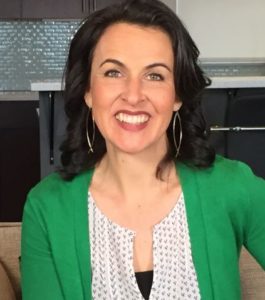Fall is the time of excitement and curiosity as children head back to school. It’s can also be a time of great concern for parents who might wonder what disturbing ideologies are being taught to their children. Our children are bombarded with troubling messages not only at school, but on social media, television, billboards, and more. So, what can parents do to arm their children against this onslaught?
If you have concerns, you won’t want to miss today’s article by Katy Faust. She gives some invaluable advice on how to prepare our children to be bold – and to see through the error in today’s messaging on controversial issues. Katy gives you lots to think about! For another great tool to prepare your children, check out United Families’ HomeFront Kids project. I’m very serious when I say: “Take a look at both; you’ll be glad you did!”
Be kind yet bold,
Wendy Wixom, President
United Families International
Your Kids Need to Hear It from You, First!
By Katy Faust
It’s that time of year again, when we send the piece of our heart that walks around outside of our body back to school. For us parents, the sendoff usually includes a combination of cheers or tears. But for those of us sending our kids to public school, the occasion may also evoke fears. When it comes to their worldview, we are not dropping our kids off at a neutral playing field. We know that the entire educational system has been captured by Wokism. And we understand, more than anyone else, the risks that Wokism – which distorts historical, economic, and biological reality- poses to our kids.
So here’s some back to school tips from a pastor’s wife and mother of four teens who, despite attending Woke public school in Seattle, are holding fast to their convictions.
Elementary school
During elementary school, your job is to saturate your children in truth and beauty. At this age, kids are little sponges- that’s why they can easily memorize huge swathes of scripture when you struggle to memorize one verse. Capitalize on this absorption gift by explaining, in age-appropriate ways, the truth about sex as a good gift between a husband and wife and the way new life begins, about the beautiful and distinct differences between men and women, and about our country whose sins were common to other nations, but whose achievements were exceptional.
At this age, they can’t filter out distorted ideas about their nation, their faith, and their own bodies. So you need to shelter them, as much as possible, from media, books, and aggressive adults who distort the truth about their country, their faith, and their bodies.
When brokenness enters their world, tell them the truth, “We love Andrew and his two moms next-door, we are just so sad that he doesn’t have a dad.” But generally at this age, shelter your kids from ideologies or people that aim to evangelize them into that brokenness.
Middle School
In middle school, your child’s brain changes, so your tactics need to change as well. In the early years they uncritically absorbed everything a favored adult told them, but around 6th grade you’ll notice they’re starting to question everything. “What if two men want to have a baby?” “Can a girl be trapped in a boy’s body?” This isn’t cause for panic, but a sign that they’re ready for what I call “the great equipping.” Whereas before you filtered out damaging and distorted ideas about history and humanity, in the middle school years you, the parent, will introduce them.
It’s important for kids to hear about pornography, Socialism, transgenderism, and revisionist history from you, mom or dad. Why is that? Because on controversial topics whoever gets to your kid first will automatically be considered the expert in your child’s mind. So if the first time your daughter hears the phrase “bisexual” is in Mr. Taylor’s 7th grade health class, who do you think she’ll return to when she sees an instagram post encouraging her to be “bi-curious?” Answer- not you. But because you, the parent, are the most invested in her well-being and future, she must see you as the authority so she will turn to you- not to her teachers, or her friends, or the Internet- when she is asked to write “a more equitable US Constitution” or has to do a book report on Stamped.
“They’re too young to hear about pornography,” or “they won’t understand the nuances of the 3/5ths compromise,” you object. But if you refuse to talk with your kids about these challenging topics, their woke teacher will happily do it for you. And I guarantee, you won’t like what they say. So the only option is for you to purposefully introduce these topics to your kids and get some foundational conversations under your belt. That will set you up for on-going conversations throughout the year.
High School
If you’ve purposefully saturated them in truth and beauty in elementary school, and helped them process competing worldviews in middle school, you will be spared a great deal of questioning in high school. But your work is not done. You may no longer be explaining the basics of sex nor why sexual feelings are inadequate as a basis of our identity. In high school, you must move from educator to consultant. Your older teen needs to be able to consult with you when their convictions are challenged- when their geometry teacher wants everyone to state and use each other‘s preferred pronouns, when their friend comes out as “pansexual,” when they choose to argue against abortion in their persuasive essay.
There are two main characteristics of a consultant- they need to be an expert on the subject matter (you’ve already proved you are) and the client has to be able to access them. To be an effective consultant, you give your teen access by staying connected to them. Many parents of highschoolers think their kids don’t need them much anymore, especially if they have “good kids.” That’s certainly true when it comes to caregiving duties like packing their lunch or folding their laundry. But not when it comes to emotional connection.
High schoolers need more parental nearness than ever. But here’s the catch- you can’t have emotional closeness without physical closeness. Being near them is a critical aspect of fortifying your high schooler. That’s because your kid will not make an appointment to process a moral quandary with you, but a retelling of their 3rd period “privilege walk” will naturally tumble out on a morning run together or when you’re ferrying them to soccer practice. If your teen is to stand firm in high school, you must be in regular proximity to them.
Model Truth and Love
Isaiah must’ve been talking about America 2022 when he warned, “woe to those who call good evil, and evil good.” It’s up to us to raise kids who can spot and refute the lies of our culture.
But our duty does not end there. In addition to training our children to think rightly, we must also encourage them to love rightly. That means initiating and extending friendship to those with whom we disagree. That means being savage with bad ideas, but gentle with people. It means holding fast to truth in one hand, and holding fast the dignity and worth of every human in the other hand. That is a difficult balance for anyone, but especially kids who are outnumbered in the classroom.
So don’t expect your children to be able to do something that you haven’t done yourself. At every stage of development, they need to be able to look to you as a model for balancing conviction and compassion. They should be watching you extend friendship to the two moms next-door. They should hear you tell of how you politely refuse HR’s request to put pronouns in your LinkedIn profile, and their “pansexual” friend should feel the most loved at your house.
It’s a crazy time to be a parent. But rest assured, that neither you nor your children are living in this country at this moment by accident. When you are purposeful about age-appropriate training, you can raise children who are influencers of culture rather than children who are influenced by culture.
_________________________________________________________________________
 Katy Faust is the founder and director of the children’s rights organization Them Before Us and author of the new book “Them Before Us: Why We Need a Global Children’s Rights Movement.” She is married and the mother of four children, the youngest of whom is adopted from China. You can follow her on Twitter @Advo_Katy.
Katy Faust is the founder and director of the children’s rights organization Them Before Us and author of the new book “Them Before Us: Why We Need a Global Children’s Rights Movement.” She is married and the mother of four children, the youngest of whom is adopted from China. You can follow her on Twitter @Advo_Katy.

